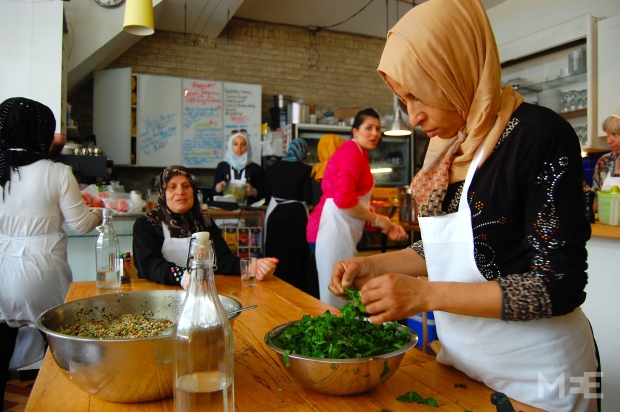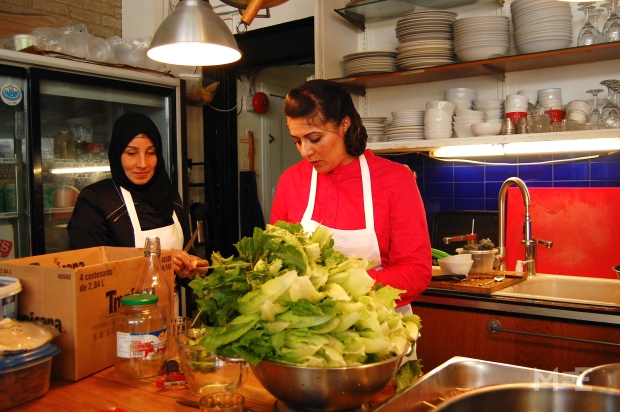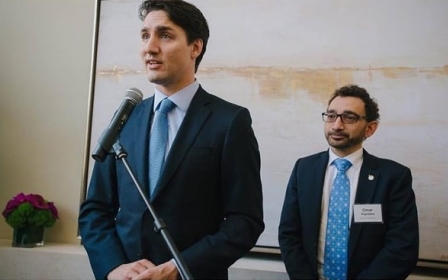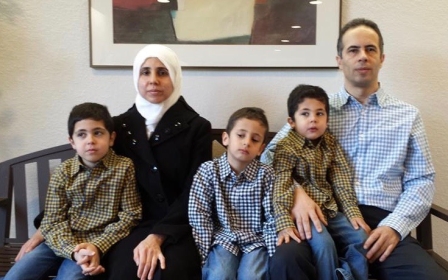Syrian women in Canada cook up a taste of home
TORONTO, Canada – Chatting around a large wooden table, Syrian women methodically scoop a mixture of rice, tomatoes, onions, fresh parsley and mint onto grape leaves.
Wearing plastic gloves and aprons, they delicately roll the leaves and place them in small mounds on plates in front of them. Then, without skipping a beat, they grab more and start the process over again.
All the while, the animated and jovial conversations around the table do not stop – nor does the cooking.
This is the Newcomer Kitchen, a volunteer-run initiative that brings Syrian refugee women together in Toronto to cook and share traditional meals from their native country with Canadians.
On the menu today is kebab hindi (lamb meat skewers in a tomato sauce), yalanji (vegetarian stuffed vine leaves), fattoush (salad with pieces of toasted or fried bread) and namoura (semolina cake doused in syrup) for dessert.
And Roshdiya al-Masri can make it all: the 56-year-old mother of 13 has been cooking since she was a teenager in her native Daraa, in southwest Syria.
“I’m so proud of Syrian cuisine,” she says, taking a quick break from rolling vine leaves.
Al-Masri came to Canada in February with two sons, while the rest of her family remains split between Syria and Jordan. She now lives in Mississauga, a large suburb west of Toronto, where she recently began learning English.
She says she hopes the Newcomer Kitchen project may one day turn into a viable business for newly arrived Syrian refugees in Toronto. But for now, the best part about coming to cook here is meeting other Syrian women.
“I like to get to know the other women and cook together,” al-Masri told Middle East Eye.
Women helping each other
Len Senater owns The Depanneur, a restaurant and kitchen space that hosts regular pop-up food events, cooking lessons, drop-in dinners with guest chefs, and other culinary workshops and events.
He launched the Newcomer Kitchen as a way to give Syrian refugee women access to a space where they could cook for their families.
With Canada resettling almost 29,000 Syrian refugees since last November, many families were put up at local hotels for weeks and even months while they searched for permanent housing.
That meant they lived out of hotel rooms and had no ability to cook their own food.
“At that time, it just seemed pretty obvious. I was like, ‘I have this big kitchen, I have some free nights. Why don’t I just invite them to come and use the kitchen?’” Senater told Middle East Eye, recalling how the Newcomer Kitchen was born.
After seeking out groups working to help Syrian refugees in the Toronto area, Senater pitched the idea to Ismail Abu Fakher and his wife, Rahaf Alakbani, Syrian refugees who themselves had recently been resettled by the Canadian government. They were immediately on board.
“We missed Syrian cooking so much,” said Abu Fakher, explaining that he brought a group of more than a dozen Syrian women to one of the first Newcomer Kitchen sessions on public transportation.
“All the women there [at the hotel], more than 15 women, were so excited for this idea and they decided to come,” Abu Fakher told MEE.
Senater said between 30 and 40 Syrian women have participated in the project to date, and seven to nine women can cook in the kitchen at any given time.
Hulia Mustafa, a mother of six from Aleppo, remembers how excited her children were when she brought rice and molokhiya (a popular vegetable soup) back to the hotel after cooking in the Newcomer Kitchen for the first time.
“My kids were so happy to eat a Syrian dish they missed so much,” said Mustafa, who has cooked at The Depanneur three times so far.
She said she most likes the feeling of camaraderie that forms between the participants.
“The women, we do everything together. We help each other,” she said. “Really, I’m so proud.”
Long-term goals
After most of the participants moved into permanent housing in Toronto and the surrounding areas – and had kitchens of their own to cook for their families – Newcomer Kitchen organisers decided to try to sell the meals online.
Today, the meals are sold for $20 each and customers can pick them up in person or have them delivered. They regularly sell out within hours, and the money generated pays for ingredients and kitchen costs, and whatever is left over is split evenly between the participants, Senater explained.
Since some of the women are on government assistance during their first year in Canada, the amount of money they make never exceeds the permissible limit, he added.
The women also prepared about 1,000 meals for the Luminato Festival, an annual arts festival in Toronto, and catered a Ramadan Iftar meal hosted by Toronto Mayor John Tory on Canada Day, 1 July.
“It’s something that’s easy to bridge the two cultures,” Senater said about the positive reaction the project has received from people in Toronto. “And the ladies themselves are incredibly proud of their skills, of their culture, of their heritage, and of their food, and they’re very eager to share it with their hosts.”
But despite the positive response, Senater said raising funds to turn the Newcomer Kitchen into a permanent, non-profit entity has been a struggle.
By July 14, an online fundraiser had raised about $12,500, or just over half of the $25,000 goal.
“I’m trying to turn it into something that’s more sustainable in the long run,” Senater said. “In order to unlock the real potential of the idea, we need resources.”
He said he hopes the Newcomer Kitchen concept can be applied in other kitchens and restaurants in Toronto and help other newcomer groups transition into life in the city.
“Specifically in the case of people who have been through the unimaginably traumatic experience of becoming a refugee, I myself can’t imagine anything more simply humanising than just coming together with a bunch of people who speak your language and making a dish that you all recognise,” Senater said.
“To be able to just come into a place even for one afternoon where things are familiar and you can demonstrate your competence and your confidence on your own terms… I think that’s got to feel really good.”
Remembering Syria
Meanwhile, back in the kitchen, Rahaf Alakbani is helping Syrian and Canadian participants communicate, translating questions and directions from English to Arabic, and vice-versa.
Alakbani says Syrian meals are best made in a big group like this, where you can “share stories, cook together, laugh”.
“Sometimes we sing also,” she told Middle East Eye as the women finished rolling the yalanji, one of her favourite Syrian dishes. “I know how to [make yalanji] from a long time because of my mum, who taught me how to cook.
“When you make [food] like this and you are alone, you feel [it’s] a little bit boring. Here it’s completely different,” she said.
Yet despite all the light-hearted fun, the women tend to avoid talking about the country they were forced to flee, Alakbani said.
“When we talk about Syria, it’s a little bit hard, you know?” she said. “Sometimes when we talk about Syria, we talk about Syria before – when it was so nice and a good country and everything was so, so excellent.
“We try to remember the good things, not the bad things.”
Stay informed with MEE's newsletters
Sign up to get the latest alerts, insights and analysis, starting with Turkey Unpacked
Middle East Eye delivers independent and unrivalled coverage and analysis of the Middle East, North Africa and beyond. To learn more about republishing this content and the associated fees, please fill out this form. More about MEE can be found here.






